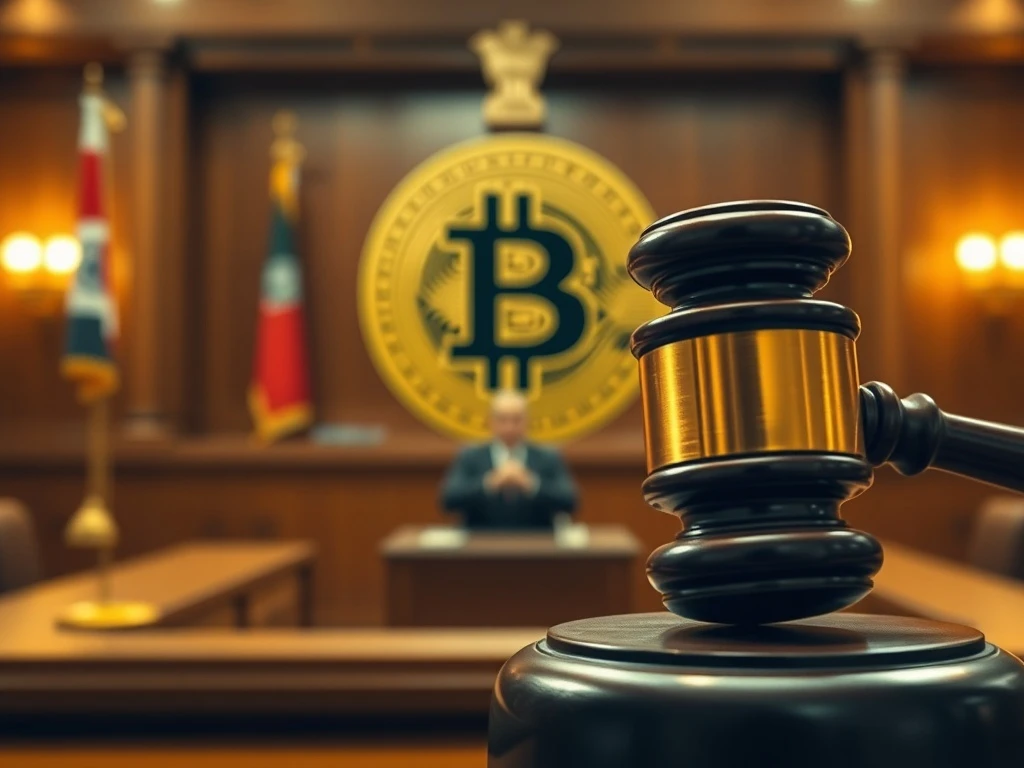Landmark Verdict: Indian Court Delivers Life Sentences in Bitcoin Extortion Case

The cryptocurrency world often grapples with its share of illicit activities. However, a recent Bitcoin extortion India case has sent shockwaves through the nation, highlighting the severe consequences for those who exploit digital assets for criminal gain. In a landmark decision, an Indian anti-corruption court has sentenced 14 individuals to life imprisonment. This includes a former Member of Legislative Assembly (MLA) from the Bharatiya Janata Party (BJP) and 11 police officials. Their crime? The brazen kidnapping and extortion of Bitcoin from a Surat-based businessman in 2018. This pivotal judgment underscores India’s commitment to combating crypto-related crimes.
Justice Served: Life Sentences for Bitcoin Extortion India Plotters
On Friday, Special Judge B.B. Jadav in Ahmedabad delivered the significant judgment. The court found the group guilty of several serious charges. These included criminal conspiracy, kidnapping for ransom, illegal detention, and assault. This verdict sends a clear message about the rule of law. Among those convicted are Jagdish Patel, a former Amreli district superintendent of police, and ex-MLA Nalin Kotadiya. All 11 police officers, including former IPS officer Patel, also faced conviction under the Prevention of Corruption Act. This was for misconduct by public servants, further tarnishing the image of law enforcement.
The case revolved around businessman Shailesh Bhatt. He had reportedly recovered a portion of his lost investment from BitConnect developer Dhaval Mavani. This recovery came in the form of Bitcoin (BTC) after the $900 million company he invested in shut down. News of Bhatt’s recovery quickly spread. Consequently, Kotadiya and senior officers in Amreli allegedly conspired to seize the digital currency.
The Shocking Details of the Surat Businessman Bitcoin Kidnapping
The abduction occurred on February 11, 2018. Bhatt was illegally held at Keshav Farm near Gandhinagar. Amreli local crime branch inspector Anant Patel led the kidnapping. Multiple officers were involved in the operation. During his captivity, Bhatt endured beatings and coercion. He was forced to admit receiving 752 Bitcoin from Mavani. Furthermore, he disclosed storing 176 BTC with his associate, Kirit Paladiya. The remaining Bitcoin had reportedly been sold for approximately $5 million.
Bhatt secured his release only after agreeing to transfer a portion of the Bitcoin and $3.6 million in cash. However, the initial deal fell through. The accused then forced Bhatt to sell 34 Bitcoin from Paladiya’s wallet. This resulted in an extortion of $150,000. This elaborate scheme highlights the sophisticated nature of Indian crypto crime. It also reveals the audacity of those involved, even individuals in positions of power.
The Investigation and Conviction of a BJP MLA in Crypto Crime
Following his ordeal, Shailesh Bhatt filed a formal complaint with the Union home ministry. This action triggered a comprehensive criminal investigation. Authorities subsequently arrested 15 individuals in connection with the case. Special public prosecutor Amit Patel spearheaded the prosecution. He presented a compelling case with 173 witnesses during the trial. The court’s rigorous examination of evidence ultimately led to the guilty verdict for 14 individuals, including the former BJP MLA conviction.
The court also ordered the confiscation of gold ornaments recovered from Amreli SP Patel. These valuables will be transferred to the Master of Mint in Mumbai. This forfeiture serves as an additional punitive measure. It also reinforces the message that ill-gotten gains will not be tolerated. This case sets a significant precedent. It demonstrates that India’s legal system is adapting to the complexities of digital asset crimes.
Implications of the Life Sentence Bitcoin Verdict for India’s Crypto Landscape
This landmark life sentence Bitcoin verdict has far-reaching implications. It signals a robust stance by Indian authorities against crypto-related criminal activities. For the burgeoning cryptocurrency market in India, such decisive action is crucial. It helps build trust and confidence among legitimate investors. The involvement of public servants and a former MLA underscores the challenge of corruption intersecting with new technologies. This case serves as a stark warning to anyone considering similar illicit schemes.
The global fight against crypto crime is intensifying. Just last week, Thai authorities arrested a South Korean man. He was accused of helping a call center gang launder cryptocurrencies into gold worth over $50 million. These incidents highlight a global trend: law enforcement agencies are enhancing their capabilities to track and prosecute crypto criminals. India’s swift and severe response in the Surat businessman Bitcoin case positions it as a serious player in this global effort.
This judgment is a testament to the perseverance of justice. It sends a powerful message that criminal exploitation of digital assets will face severe repercussions. As the crypto ecosystem continues to evolve, legal frameworks and enforcement must adapt. India’s latest verdict is a significant step in ensuring a safer and more secure environment for all crypto participants.









